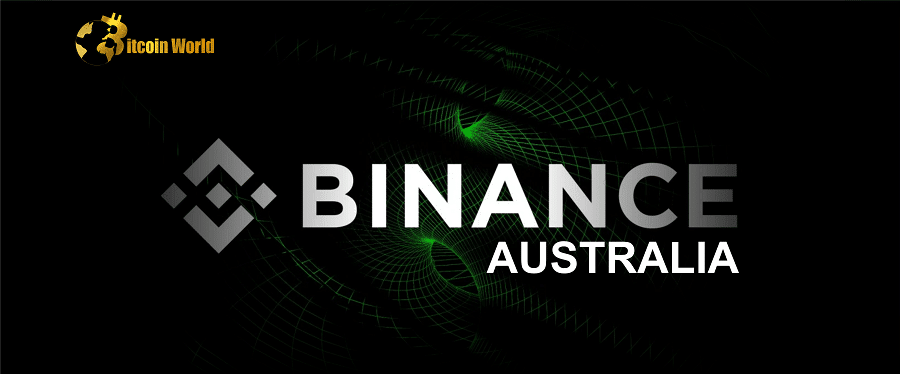Big news for crypto enthusiasts in Australia! The Australian Securities and Investments Commission (ASIC), the country’s market watchdog, has announced a targeted review of Binance Australia’s derivatives operations. This development follows Binance’s own admission of a significant misstep – incorrectly categorizing around 500 Australian users as “wholesale investors.” Let’s dive into what this means for Binance, its users, and the broader crypto landscape in Australia.
Why is ASIC Reviewing Binance Australia?
The core of the issue stems from Binance’s error in labeling certain Australian customers as “wholesale investors.” In Australia, financial regulations draw a clear line between retail and wholesale investors, especially when it comes to complex financial products like derivatives. Here’s a quick breakdown:
- Retail Investors: These are your everyday investors, often with less experience and potentially more vulnerable to risk. Australian regulations are designed to protect retail investors by restricting their access to high-risk financial instruments like futures and derivatives.
- Wholesale Investors: These are typically sophisticated or high-net-worth individuals and entities who are deemed to have the knowledge and experience to understand and manage the risks associated with complex investments, including derivatives.
Because of this regulatory distinction, retail traders in Australia are generally prohibited from trading futures and financial derivatives. Binance, by mistakenly classifying retail users as wholesale, inadvertently allowed these users to access derivative products they shouldn’t have been able to. This misclassification is what triggered ASIC’s current review.
According to ASIC’s official statement, the review is specifically focused on Binance Australia’s derivatives business and includes an examination of “classification of retail clients and wholesale clients.” This means ASIC wants to understand how Binance categorizes its users and ensure they are complying with Australian financial services license obligations.
Binance’s Mistake and Response
The issue came to light when Binance itself acknowledged the error. They admitted to incorrectly labeling approximately 500 Australian users as wholesale investors. This mislabeling had a direct consequence: the derivative positions of these users were abruptly closed. Imagine the disruption and potential financial impact for those affected!
Binance has stated that they have already reached out to all affected users and committed to providing full compensation. This proactive step is likely aimed at mitigating damage and demonstrating cooperation with regulators. However, the incident has already caught the attention of ASIC, leading to the formal review.
In social media posts, Binance mentioned the incorrect categorization. ASIC has noted that Binance should have reported this matter to them directly and that failing to do so is a violation of their Australian Financial Services Licence obligations. This highlights another layer of scrutiny – not just the misclassification itself, but also the reporting procedures Binance followed (or didn’t follow) after discovering the error.
What Does This Mean for Crypto Users in Australia?
This situation raises several important points for crypto users in Australia and the broader crypto industry:
- Increased Regulatory Scrutiny: This ASIC review is a clear signal that Australian regulators are paying close attention to cryptocurrency exchanges operating within their jurisdiction. Compliance with financial regulations is paramount, and mistakes, even unintentional ones, will be taken seriously.
- Importance of User Classification: The distinction between retail and wholesale investors is a fundamental aspect of financial regulation in many countries. Crypto exchanges operating globally need robust systems to accurately classify their users and ensure they are offering services that comply with local laws.
- Transparency and Reporting: Prompt and transparent communication with regulators is crucial. ASIC’s comments about Binance’s reporting obligations underscore the importance of exchanges proactively informing regulators of any compliance issues.
- Potential for Stricter Regulations: Incidents like this can sometimes lead to calls for tighter regulations in the crypto space. While the current review is targeted at Binance, its outcome could influence future regulatory approaches to crypto exchanges in Australia.
- User Awareness: For crypto users, especially those interested in trading derivatives, it’s essential to understand the regulatory landscape in their country. Be aware of the rules regarding retail and wholesale investor classifications and the types of products you are eligible to trade.
Key Takeaways
Let’s summarize the key takeaways from this developing situation:
- ASIC is reviewing Binance Australia’s derivatives business due to the misclassification of retail users as wholesale investors.
- Binance admitted the error, closed affected users’ derivative positions, and promised compensation.
- The review focuses on Binance’s client classification processes and their compliance with Australian Financial Services Licence obligations.
- ASIC is concerned about Binance’s failure to report the issue promptly.
- This incident highlights the growing regulatory scrutiny of crypto exchanges in Australia and globally.
- Users should be aware of investor classifications and regulations in their jurisdiction, especially regarding derivatives trading.
Looking Ahead
The outcome of ASIC’s review remains to be seen. It will likely involve a thorough examination of Binance Australia’s operations and could potentially lead to further actions or recommendations from the regulator. For Binance, this is a critical moment to demonstrate its commitment to compliance and regain trust. For the broader crypto community in Australia, it’s a reminder that as the industry matures, regulatory oversight will continue to evolve and play an increasingly important role. Stay tuned for further updates as this story develops!
Disclaimer: The information provided is not trading advice, Bitcoinworld.co.in holds no liability for any investments made based on the information provided on this page. We strongly recommend independent research and/or consultation with a qualified professional before making any investment decisions.


